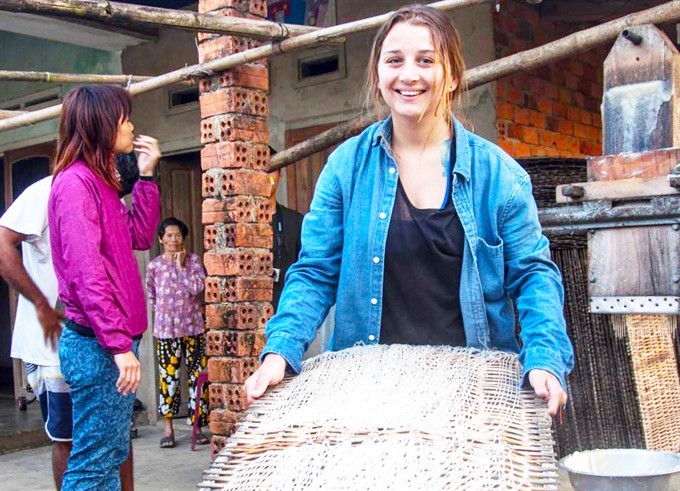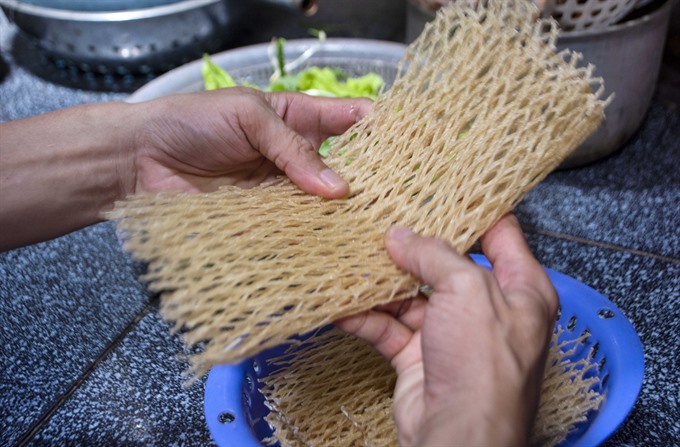 Features
Features

After years researching the nutritional value of cassava, Dương Ngọc Ảnh from Quảng Nam Province has revolutionised the instant noodle market in Việt Nam by making the easy treat from the common root. Now he plans to grow his business and take his innovation nationwide.Trần Hoàng Nam reports.
 |
| Top student: Dương Ngọc Ảnh (second from left) receives a certificate after a start-up course in Israel. Photo courtesy of Dương Ngọc Ảnh |
After years researching the nutritional value of cassava, Dương Ngọc Ảnh from Quảng Nam Province has revolutionised the instant noodle market in Việt Nam by making the easy treat from the common root. Now he plans to grow his business and take his innovation nationwide.Trần Hoàng Nam reports.
When he was a 12, Dương Ngọc Ảnh would wake at 4am every day to help his parents make noodles from cassava powder before going to school. The income generated from this family business meant that Ảnh could attend HCM City Technology & Sciences University. He then went on to set up his own software company.
“My father was the first to make noodles from cassava 22 years ago,” he said. “Thanks to his efforts, instant noodles made in Đông Phú Village became popular around the country.”
However, in recent years, Ảnh witnessed trade dwindle and life got harder for his family.
“I decided to spend my time restoring this fading industry,” he said.
He spent a year researching the nutritional values of the product, finding ways to develop and upgrade machinery, before officially launching a new instant noodle product in July 2018.
Ảnh set up the Caromi Company, revolutionising the instant noodle business.
“My project received a lot of assistance from the Đà Nẵng Enterprises Association, where I learned from local and foreign experts,” he said.
Ảnh realised that cassava is very nutritious and grows abundantly throughout the country.
"Cassava contains lots of minerals, reduces cholesterol and helps you lose weight," he said. "It’s a good substance for keeping fit."
Ảnh’s company adopted the slogan ‘Back to the roots’.
He aims to make instant cassava noodles Việt Nam’s spaghetti.
Instant cassava noodles can be soaked in water or stir-fried rather than boiled like other popular kinds of instant noodle.
 |
| Super food: A bowl of cassava noodles ready to eat. |
 |
| Try it out: A foreign tourist tries to make cassava noodles at Caromi’s workshop in Hội An. |
 |
| Easy to make: To use dried cassava noodles you need to soak it in water first. |
He tried to produce noodle from fresh cassava instead of dried cassava.
“Using dried cassava, I cannot ensure its quality,” he said. “The material can grow mould. But if I use fresh cassava, I can control the quality and products will look better.”
However, fresh cassava depends on the harvest. Normally, he is able to collect fresh cassava for just one month. To solve the problem, Ảnh co-ordinated with Duy Xuyên District authorities to order farmers to plant cassava according to his schedule to have sufficient material all year round.
The outer skin of fresh cassava roots can also be fermented to make a biological fertiliser that is given free to farmers.
He also mixes spiny bitter gourd and turmeric to the cassava noodles to make it more appetising and more nutritious.
On top of producing traditional instant cassava noodles with shrimp, pork and fish paste, he has invested in a new kind of noodles with seaweed – specially designed to help lose weight.
“Cassava contains a lot of fibre, which helps you feel full for longer,” he said. “It’s a safe food for people who want to lose weight.”
The company now produces 100kg of product each day, which will increase to 300-500kg per day in the near future.
Caromi’s products are sold at local markets in Quảng Nam Province, Đà Nẵng, Huế, the southern province of Bến Tre as well as high-end restaurants in Hội An, Đà Nẵng and HCM City.
“If my company develops well, it will offer jobs to at least ten workers in the first year and 30 workers when we can build a plant,” he said.
We plan to use cassava from 20ha of farmland in the first year and 60ha in the next three years, involving 300 farming households in the process.
Ảnh said he has opened a workshop in Hội An to offer tourists the chance to experience making cassava noodles and enjoy the product on-site.
“Cassava noodles are a fairly new product,” he said. “This could be the future for food in Việt Nam.” VNS




